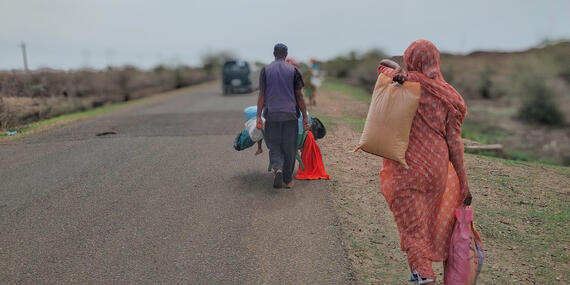Today's top news: Occupied Palestinian Territory, Sudan

Occupied Palestinian Territory
Multiple strikes across Gaza have reportedly killed and injured dozens of people. One of these attacks occurred just a few hundred meters away from our Joint Humanitarian Operations Centre in Deir al Balah, which is used by the UN and our NGO partners.
Regarding displacement, OCHA reports that families continue to move from Gaza city to Deir al Balah, with more than 1,000 people observed crossing in the past week.
They travel mainly on donkey carts, but also use cars, tuk-tuks and travel on foot, carrying only a few belongings. Many of these people told our teams that they have been displaced multiple times and cannot afford another displacement financially. These people are among the most vulnerable, and our teams have been deployed daily along their displacement routes to provide basic life-saving assistance, such as water, hot meals, food parcels, and health and nutrition support.
The lack of electricity and fuel continues to impact basic service providers, including hospitals, ambulances, bakeries, and aid trucks. Over the past two weeks, the UN has been able to collect about 80,000 liters of fuel per day, on average, up from about 45,000 liters per day in the last two weeks of June. While this represents an improvement, the requirement for the most basic humanitarian operations stands at 400,000 liters per day, and the Israeli authorities are still not allowing the allocation of fuel to key local humanitarian responders, preventing them from transferring supplies within Gaza.
Sudan
OCHA continues to sound the alarm on the situation in Sudan – where another grim milestone in the conflict has been reached.
The International Organization for Organization now says more than 10 million people have been displaced since fighting broke out in April of last year. This means that 20 per cent of Sudan’s population – 1 in 5 people – have been forced to flee in the span of just 15 months.
The majority of those displaced are inside Sudan – almost 8 million people – and over half of them are children. Meanwhile, more than 2 million people have crossed into neighbouring countries.
The humanitarian community in Sudan is doing everything possible to scale up assistance for people in need – including those who have fled the fighting. Today, the UN Refugee Agency (UNHCR) announced the delivery of relief items for 2,000 displaced and vulnerable families in East Darfur. And over the weekend, the World Food Programme announced the delivery of food assistance for more than 120,000 internally displaced people in South Kordofan.
However, aid organizations in Sudan continue to face major challenges, including ongoing insecurity, access constraints, and funding shortfalls.
Although funding for this year’s Humanitarian Response Plan has increased over the past week, the plan is just 30 per cent funded more than halfway through the year, with US$820 million received of the $2.7 billion needed. We urgently appeal to donors to make good on their pledges and increase their support.
